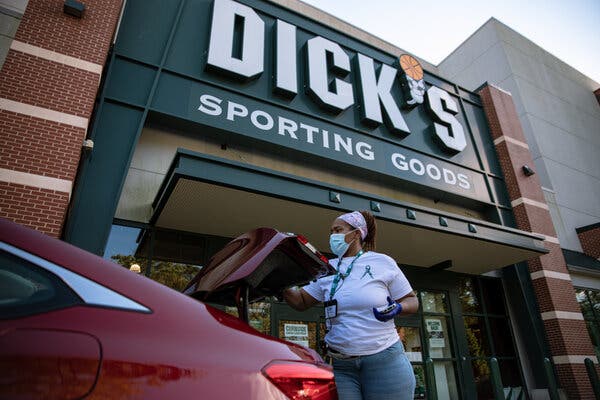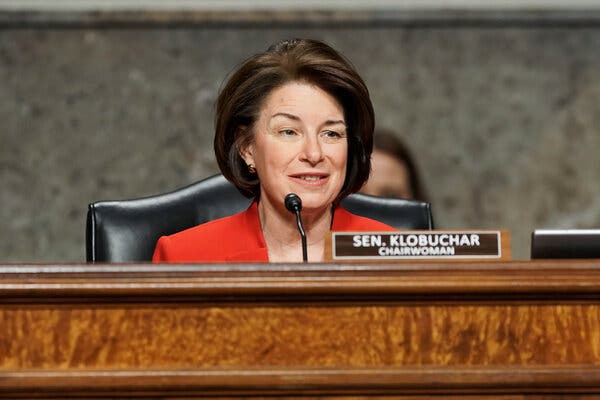By: Ella Koeze·Data delayed at least 15 minutes·Source: FactSet
Wall Street’s rally stretched into a third day on Thursday, with the S&P 500 reaching a record high, as investors stopped worrying about inflation and rising interest rates and focused instead on what looks to be an increasingly peppy economic recovery.
The S&P 500 rose 1 percent, climbing above its Feb. 12 closing high, while the technology-heavy Nasdaq composite jumped more than 2.5 percent, amid encouraging updates on the rollout of vaccines and reopening of the economy.
Over the last month, the outlook for the economy has brightened quickly, as the vaccine rollout has picked up steam and the Biden administration pushed for, and enacted, a larger stimulus plan than many had expected.
Economist surveyed by Bloomberg now expect the economy to grow by 5.5 percent in 2021, up from expectations for a 4.1 percent growth rate just a month ago. If that 5.5 percent rate is achieved it would be the best year for the American economy since 1984.
“This is a reaction to a dramatically improving economic outlook,” Kristina Hooper, chief global market strategist at the investment management firm Invesco, said of the market rally. “This is a just a very visceral reaction to an improvement in the timeline for vaccine distribution and the prospects for a very robust reopening.”
Companies that will benefit from the speedy rollout of vaccines and reopening of the economy rose on Thursday. The Russell 2000 index of small stocks, closely tied to the near-term outlook for the economy, rose more than 1 percent.
Energy and raw materials firms also posted gains. Oil futures rose. West Texas Intermediate crude, the U.S. benchmark, gained 2.5 percent, to about $66 a barrel.
It also helped that bond yields, whose rise has been a recent worry for the market, were stable on Thursday.
The yield on 10-Year Treasury notes held steady at 1.52 percent. In recent weeks, stocks stumbled as the yield jumped above 1.6 percent, its highest level in a year.
Rising bond yields can be a problem for stocks for a number of reasons.
Bond yields are the basis for most borrowing costs for consumers and companies, so when they go up, they can slow economic growth, hurt corporate profits and make owning stocks slightly less attractive.
And because yields are essentially the interest payments that bond investors collect, higher yields make owning bonds more attractive compared to stocks. Their rise can siphon money from the stock market.
Valuations of technology firms — especially those with high prices relative to the prospect for profits in the coming years — are also especially sensitive to interest rates. And the increase in rates has weighed heavily on tech in recent weeks.
But tech stocks have bounced back sharply this week. Tesla, Elon Musk’s electric car company, rose 4.7 percent on Thursday.
Other large technology firms that exert a large influence on market capitalization weighted indexes such as the S&P 500 also jumped on Thursday. Microsoft, Alphabet, Amazon and Apple were all higher.
The Labor Department announced two moves on Thursday to reverse rules issued under the Trump administration that narrowed the protection of federal law for millions of workers.
One of the rules was likely to have deemed millions of workers in industries like construction and transportation — many of them gig workers — to be contractors rather than employees.
The department had finalized the rule in January, two weeks before President Biden’s inauguration. But the Biden administration has delayed the rule’s effective date until May, a step toward rescinding it. The rule would probably have made workers like Uber drivers ineligible for the federal minimum wage and overtime pay, which apply only to employees.
Industry officials have estimated that treating gig workers as employees can raise labor costs by 20 to 30 percent, and Uber and other gig companies have fought on multiple fronts over the years to classify workers as contractors.
In November, voters in California approved a ballot initiative freeing gig companies from a state law that had effectively required them to treat workers as employees, a campaign in which Uber, Lyft and DoorDash invested tens of millions of dollars. Mr. Biden opposed the effort to scale back the law, though some prominent supporters and advisers to him and Vice President Kamala Harris have ties to the gig companies.
In its proposal to rescind the Trump rule, the Labor Department said the rule had improperly narrowed the list of factors that courts have traditionally relied on to determine employee status.
The department said it was also moving to undo a second rule enacted by the Trump administration, this one governing when a company should be considered a so-called joint employer alongside franchisees or contractors that directly employ a worker.
Franchisees and contractors often have limited resources to pay legal penalties related to violations of minimum-wage and overtime laws, so a more expansive joint employer rule makes it more likely that employees can be made whole if a violation has occurred.
The Trump rule had narrowed the circumstances under which a company could be considered a joint employer. In September, a federal judge struck down most of the Trump rule, arguing that the administration had arbitrarily departed from the statute governing federal minimum-wage and overtime rules.
The public will have until April 12 to comment on the moves announced Thursday, after which the Labor Department can finalize them.

Jeffrey Epstein’s Manhattan mansion has been sold to an unidentified buyer for about $51 million, which will go to a fund providing restitution for the disgraced financier’s sexual abuse victims.
A lawyer for Mr. Epstein’s estate said the seven-story mansion on East 71st Street was sold earlier this week — although for considerably less than the initial $88 million asking price.
The sale was completed after a judge in the U.S. Virgin Islands rejected an attempt by the territory’s attorney general to freeze the sale of any further asset by his estate, which is now worth about $240 million. Once valued at nearly $600 million, the estate has been paying out expenses including taxes and contributions to the restitution fund, which has distributed about $55 million to dozens of Mr. Epstein’s accusers.
The attorney general, Denise George, requested the asset freeze after the estate said a cash crunch was preventing it from providing new money to the restitution fund. The judge overseeing the administration of Mr. Epstein’s estate ruled that Ms. George did not have legal standing to request the asset freeze.
A deed for the sale has yet to be recorded, but Daniel Weiner, one of the estate’s lawyers, said in an email that funds from the sale were being transferred to the compensation program so that it could “resume issuing new claims determinations.”
Several other major transactions loom, including the sales of Mr. Epstein’s homes in Palm Beach, Fla.; Paris; and New Mexico, and the two private islands he owned in the Virgin Islands. The sale of the islands, however, will not happen anytime soon: Ms. George’s office has placed a lien on them as part of the civil racketeering lawsuit she filed last year against Mr. Epstein’s estate.
Mr. Epstein killed himself while in federal custody in August 2019, a month after his arrest on sex trafficking charges. To date, about 150 women — most of whom claim they were sexually abused by Mr. Epstein as teenagers — have registered with the restitution fund to submit claims.

The White House announced four senior Treasury Department nominations on Thursday, building out Treasury Secretary Janet L. Yellen’s team as she assumes a central role in carrying out the $1.9 trillion stimulus package that President Biden signed into law Thursday.
Joining the top ranks at Treasury will be Nellie Liang, the nominee to be under secretary for domestic finance, Lily Batchelder as assistant secretary for tax policy, Ben Harris as assistant secretary for economic policy and Jonathan Davidson as assistant secretary for legislative affairs.
The hires bring a mix of progressive bona fides and steady-hand experience in economic policymaking that has been the hallmark of most of Mr. Biden’s staffing decisions thus far. Ms. Yellen’s team has prioritized making the United States economy more equitable as it recovers from the pandemic, and the nominees will have central roles in shaping the administration’s agenda on financial regulation and tax policy.
If confirmed, Ms. Liang will be Treasury’s first under secretary for domestic finance since 2014. Ms. Liang previously spent three decades on the staff of the Federal Reserve, rising to lead a department created after the financial crisis to monitor financial stability.
In 2018, Ms. Liang was tapped by former President Donald J. Trump to join the Fed’s board of governors — one of his few picks that was applauded by Democrats. But after Republicans expressed concern that she would push for more strict regulation of banks, she withdrew her name from consideration for the job.
Ms. Batchelder, a tax professor at the New York University School of Law, previously served as deputy director of the White House National Economic Council during the Obama administration. A favorite of progressives, Ms. Batchelder has written about the need for taxing inheritances at higher rates and argued that the current system cements economic inequality in the United States.
Mr. Harris previously served as a chief economist to Mr. Biden when he was vice president and played a leading role in creating Mr. Biden’s campaign agenda. A veteran of Washington’s think tank world, Mr. Harris is also a professor at Kellogg School of Management at Northwestern University and was chief economist for Results for America, a nonprofit group that pushes for evidence-based policymaking.
During the campaign, Mr. Harris, who has close ties to the White House, also served as a liaison to the business community and sought to reassure executives about Mr. Biden’s policies.
Mr. Davidson, the assistant secretary for legislative affairs, is a longtime Capitol Hill staff member who has been chief of staff for Senator Michael Bennet, the Colorado Democrat, for the last decade.

Lauren Hobart moved up from president to chief executive of Dick’s Sporting Goods last month, becoming only the third leader in the retailer’s 70-plus-year history. Ed Stack, the son of the company’s founder, stepped down after 36 years as chief executive and is now executive chairman.
Ms. Hobart spoke with the DealBook newsletter in her first interview since taking the top job.
“The pandemic changed us radically and I think for the better,” Ms. Hobart said.
The company had already moved its digital operations in-house, which allowed it to shift quickly as its stores were forced to close. “The team spun up curbside pickup for the first time in two days,” she said. “It was a project that would have taken 12 to 18 months before.”
An uptick in demand for golf equipment and at-home fitness gear has bolstered the company’s earnings, with sales last year up 10 percent.
Female shoppers were also a part of that growth, and a booming part of the sportswear business in general. This week, Dick’s started a campaign featuring women in sports — and in business. The retailer plans to donate 100,000 sports bras to female athletes in need over the next 18 months. It has worked with its vendors to make sure it has products made specifically for women — rather than the “pink it and shrink it” approach athletic brands took to female-oriented gear in the past. As part of those efforts, Dick’s has worked with Brooks Running on an “Empower Her” shoe collection.
Ms. Hobart, who joined Dick’s in 2011 as chief marketing officer, and other women who serve as managers at the company are featured in the campaign.
“We really wanted to celebrate women,” Ms. Hobart said, “and talk about the fact the leadership team at Dick’s really is passionate about improving sports for girls and women — and that we represent the people that we’re advocating.”
Predicting the path ahead after a year unlike any other is difficult, Ms. Hobart acknowledged. “Forecasting for 2021, I think, for all business, is very challenging,” she said.
The company issued somewhat muted sales guidance to investors this week, but Ms. Hobart expects that some pandemic trends, like the rising interest in golf, will stick. “It’s so uncertain to know how the consumer is going to respond,” she said. “We’re just taking one day at a time.”

A sprawling marketing campaign to raise awareness of Covid-19 vaccines recruited four former presidents — Barack Obama, George W. Bush, Bill Clinton and Jimmy Carter — along with their spouses, Michelle Obama, Laura Bush, Hillary Clinton and Rosalynn Carter.
Missing from the lineup of new public service announcements: former President Donald J. Trump and his wife, Melania Trump.
The ads, released on Thursday by the nonprofit advertising group Ad Council and a coalition of experts known as the Covid Collaborative, are part of a $52 million campaign to combat vaccine skepticism that already includes more than 300 companies, community groups and public figures. In mid-February, the Ad Council said it had added new partners to the effort, including Amazon, Apple, ViacomCBS and Wells Fargo.
Two spots feature the former presidents and their spouses talking about the prepandemic moments they miss and the importance of vaccination.
Asked whether Mr. Trump declined to participate in the campaign, an Ad Council spokeswoman, Ellyn Fisher, said that the project with the former presidents began in December, before Mr. Trump left office.
“Some of the ads, for example — the one featuring former presidents Obama, Bush and Clinton together, were shot at the inauguration, which President Trump didn’t attend,” she said, adding that Ad Council learned only last week that Mr. Trump had received a vaccine.
Mr. Trump did not expressly encourage Americans to get vaccinated until late last month, when he said at the Conservative Political Action Conference conference in Orlando, Fla., that “everyone should go get your shot.”
On Wednesday, he released a statement claiming credit for the vaccine, saying that “if I wasn’t President, you wouldn’t be getting that beautiful ‘shot’ for 5 years, at best, and probably wouldn’t be getting it at all. I hope everyone remembers!”
Mr. Trump has continued to refer to Covid-19 as “the China Virus,” rhetoric that has been linked to a surge in anti-Asian violence and harassment, according to community leaders.

Congress will take up antitrust issues in full force this week, holding the first in a series of hearings about the power of Big Tech and corporate concentration across the economy.
At 10 a.m. on Thursday, the Senate antitrust subcommittee will examine modernizing century-old antitrust laws. Senator Amy Klobuchar, the Minnesota Democrat and chairwoman of the subcommittee, is expected to start with a broad survey of economic problems. The committee has called witnesses from academia, a corporate law firm and nonprofit think tanks.
“I want to start big and talk about consolidation across so many industries,” Ms. Klobuchar said in an interview. She said she also planned to outline specific problems, including the behavior of tech companies like Google and Facebook, which have gobbled up competition and have also threatened to leave Australia because of regulations that would force them to pay publishers more for their content.
“Tech competition disrupts things and we don’t want less disruption, we want more disruption and disrupters,” Ms. Klobuchar said.
On Friday, the House antitrust subcommittee will hold a hearing on how online platforms have harmed journalism and newsrooms. Witnesses in that hearing will include leading lobbyists for the broadcast and newspaper industries as well as Brad Smith, the president of Microsoft.
Representative David Cicilline, the Democratic chairman of the committee, and Representative Ken Buck, the Republican ranking member, joined numerous other lawmakers on Wednesday in introducing a bill called the Journalism Competition and Preservation Act. The bill would allow small news organizations to band together to collectively bargain for fees from online platforms that host their news. A similar law in Australia recently set off a battle between the Australian government and Google and Facebook.
Mr. Smith of Microsoft has recently come to support publishers who want to negotiate as a group. He said recently that the spate of disinformation around the U.S. election and subsequent Capitol riots highlighted the importance of preserving news organizations — particularly local news — while misinformation is spread via online platforms like Facebook and Google.

General Electric said it planned to build the football-field-long blades for its new offshore wind turbines at a plant in northeastern England.
The new factory will be in the Teesside region, an area that was recently named by the British government as a so-called freeport, with tax benefits and other business incentives. The plant will open in 2023 and create 750 jobs, according to a statement from G.E. late Wednesday.
Ben Houchen, the Tees Valley mayor, is working to rejuvenate the region by attracting investment in clean energy, including offshore wind power and a carbon-capture development. The new plant will produce blades for a large wind farm called Dogger Bank offshore in the North Sea.
Although Britain has become the world’s largest market for offshore wind turbines, some critics point out that most of the turbines are manufactured elsewhere, including Denmark and Germany. Blade factories are eagerly sought by local authorities, because they employ large numbers of people.
The blades, which will be about 350 feet long, will go on top of G.E.’s Haliade-X turbines, a prototype of which is being tested in Rotterdam, the Netherlands. The new turbine has already set off a race among manufacturers to build bigger machines.





